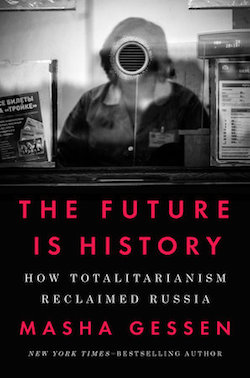Literary Event of the Week: Masha Gessen at Piggott Auditorium
Permit me a moment to entertain my own craven self-interest: Reading Through It, the book club co-sponsored by the Seattle Weekly and the Seattle Review of Books, is happening tonight at Third Place Books Seward Park. We meet at 7 pm, you can bring booze to the book club, and no purchase is necessary. We’ll be discussing Noam Chomsky’s book Requiem for the American Dream. Our Trump-era book club is still going strong, with dozens of folks coming out for last month’s event, but there’s always room for you.
Not every book we’ve featured at Reading Through It has been great — looking at you, Hillbilly Elegy — but one of the most successful discussions we’ve had was for New Yorker author Masha Gessen’s The Man Without a Face: The Unlikely Rise of Vladimir Putin. Gessen is an exemplary journalist who knows when to sit back and let the facts speak for themselves. When writing about the rise of Putin, she knows that no amount of fancy adjectives can outstrip the horrors committed by the man, so she simply reports in clear language and allows readers to color in the details of the ghastly assassinations and brutal intimidation tactics on their own.

Now, Gessen is returning to Seattle at a special Sunday event, at 6 pm at Piggott Auditorium on Seattle University campus. She’s reading from her brand-new book The Future Is History: How Totalitarianism Reclaimed Russia. This book just might be the culmination of Gessen’s life’s work: a comprehensive and dense piece of reportage that details how the world’s other superpower collapsed after communism and then found a weird afterlife as a nasty mobster of a nation.
While it’s unlikely that Gessen included much — if anything — in the new book about Russia’s interference in the 2016 presidential election, it’s very likely that American readers will be able to make some inferences from History. In our book club, Man Without a Face heavily informed both our understanding of Donald Trump and our comprehension of how and why Russia might have gotten involved with our electoral process.
If you’ve been confused by all the talk about the so-called “Russia stuff” — the conversation about how Russia might have helped elect Donald Trump — this might be the most important book you’ll read all year.
Gessen is the best kind of non-fiction writer: she teaches her audience to be smarter. She doesn’t just jump to conclusions: she provides the evidence to her readers and allows them to make connections. And with this magnum opus of a book about the fall and rise of the world’s most misunderstood antagonist, it’s very likely that American audiences will soon learn more about Russia than they ever thought possible.